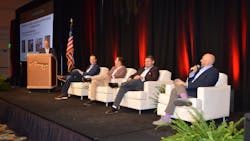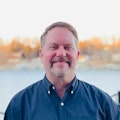A panel of four independent multi-shop operators, one of the presentations at the MSO Symposium Oct. 30 at the Mirage Convention Center in Las Vegas, explored the challenges and opportunities of growing an MSO in their discussion, "The challenges and opportunities of growing an MSO."
Collision Advice founder and owner Mike Anderson moderated the panel with questions and answers in rapid-fire succession.
Here are just a few takeaways of that discussion, which included Casey Lund, owner of Collision Leaders, with eight locations in Kansas and Missouri (and profiled in this issue); Ryan Clark, vice-president of Eustis Body Shop, with six locations in Kansas; Doug Martin, president of Martin’s Body Shop, with three locations in southern Indiana; and Andy Tylka, owner and CEO of TAG Auto Group in Indiana and Illinois, with 14 shops and four Midwest ADAS standalone calibration centers.
How they started growing
The panelists have grown rapidly, and each had similar but different reasons for wanting to expand. For Lund, it was the realization once he had been able to “10x” his business within its same four walls, one booth, and one shift. The achievement came at the same time he’d finished his two-year volunteer term as Warrensburg, Mo., mayor and had stepped back into the business.
“It was kind of a tough pill to swallow,” he said. “But eventually, I kind of realized that, ‘Hey, they don't need me. Where can I divert my attention?’ And that's what got me thinking about growth."
For Clark, it was the need to move the business into more populated areas from its rural roots.
“We realized that those sales weren't sustaining for the type of income potential that we wanted,” he said. “So, we focused on growing into some bigger markets and expanding to help provide for our families.”
Martin said his second location, purchased as an asset sale, allowed him to provide an opportunity for some talented people on his team.
“We had a good opportunity in a location that was close,” he said. “We had staff on the team who deserved more, and I knew that they had some ability to grow with a little push. For the third store, I was approached by someone who was a longtime family friend, and it was just a great perfect fit.”
Tylka began in the collision repair business when he bought the original location, Tom & Ed's Auto Body, from his father.
“Three months later, somebody told me someone wanted to sell a little bit south of me, and it turned out to be three hours away.”
That led to Tylka to decide to keep the businesses’ branding that was familiar to locals, coming up with the “TAG” name as the brand for all businesses.
He said he enjoys the acquisition process.
On how to plan for proper staffing levels
When planning for growth, the panelists agreed it’s ideal to be able to grow the staff before expanding. As Anderson pointed out, staffing up before an acquisition or a nearby greenfield expansion means additional overhead. So, some operators get the next location and then worry about a proper staffing level once volume supports that.
“I've done it both ways,” Lund said. “I much prefer to staff ahead of time before you're ready to grow. It is expensive. But it allows you to grow in a more prescribed proactive way. Rather than burning people out and half-assing stuff, it allows you to kind of be prepared.”
Clark said his company staffs prior to an expansion.
“It's also helped us get a career path for some of our people in our organization that may not have another anywhere else to go. So, as we're acquiring or building new locations, it's helped us fill through the pipeline.”
For Martin’s second location, a vacant shop, “what we did was try to insert people who had our morals and values and then built around them. And then the third location actually was already staffed up, and we're working through that. So moving forward, ideally the best thing would be for us to take on people who want to grow, and then insert them. I’m going to say it's a hybrid thing, but having the people who have our core values in hand, they can go and disperse those to our new team, obviously with the help of leadership to instill our morals and values and identity.”
On OEM certifications and EV adoption
For the shops located in more rural areas, they reported they are not pursuing EV repairs, taking a “wait-and-see” approach. But all have a focus on OEM certifications.
We are customer-focused, and have seven OEM certifications between our three stores,” Martin said. “Some of them do overlap. We do have a DRP and some fleet accounts, but for the most part, we’re focused on our customer-facing OEM certifications.”
Clark echoed his sentiment.
“We focus on the quality of the product over speed a little bit, so we do focus on OEM certifications. That being said, and as we've grown, we do have some DRP relationships, too, that we partner with, and we see that as a partnership to help us grow.”
Lund’s shops have 18 OEM certifications and a few DRPS.
“We have shied away from some of the fleet work kind of stuff, as we couldn't switch gears as quickly on that,” he said.
How they stand out from the competition
“How do you feel how do you feel that you differentiate yourself?” Anderson asked the panel. “Let's say there's an insurer sitting here today. How would you say that you differentiate yourself from your local competition? And from a national MSO?”
Lund said it’s Collision Leaders’ people.
“They're the ones who named our business Collision Leaders because they teach each other and train to be leaders every day. And that's the most important asset that we have. And so we kind of pour everything we have into them, allowing them to understand that greater systems view, but I give them the autonomy to step outside the box, whenever they're dealing with customers to go above and beyond. And that's kind of the basics that set us apart from a customer service perspective.”
Clark said his company’s focus is on the customer experience.
“We have pretty in-depth QC products,” he said. “So we track and make sure that we don't have a lot of comebacks.”
A look at Martin’s customer reviews on Google, he said, are the proof that his employees are “trained to treat people like people."
“It's not about just CSI or getting some scores or some KPI. It's about giving people an experience that matters that they're going to remember, in a time that is not fun. We need to make something special for them. And my team does an awesome job at that.”
For Tylka, it's his flexibility of a single owner.
“So, you still get that family feel. Everyone still has the owner's phone number, and we still have the parties, the togetherness, and I think that's what sets us apart.”
About the Author
Jay Sicht
Editor-in-Chief, FenderBender and ABRN
Jay Sicht is editor-in-chief of FenderBender and ABRN. He has worked in the automotive aftermarket for more than 29 years, including in a number of sales and technical support roles in paint/parts distribution and service/repair. He has a bachelor's degree in journalism from the University of Central Missouri with a minor in aviation, and as a writer and editor, he has covered all segments of the automotive aftermarket for more than 20 of those years, including formerly serving as editor-in-chief of Motor Age and Aftermarket Business World. Connect with him on LinkedIn.
Don't miss Jay's next article or podcast. Sign up for FenderBender Today's Collision Repair News and ABRN eNews here.

